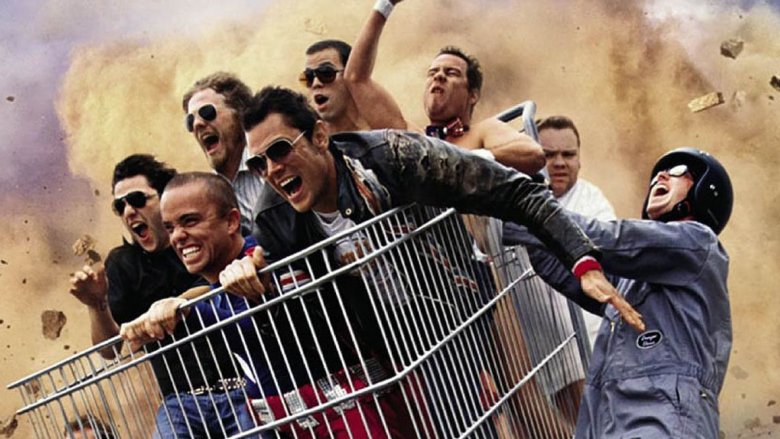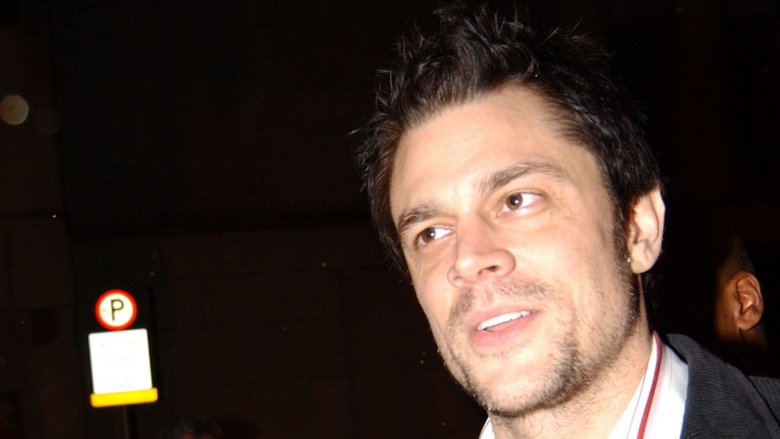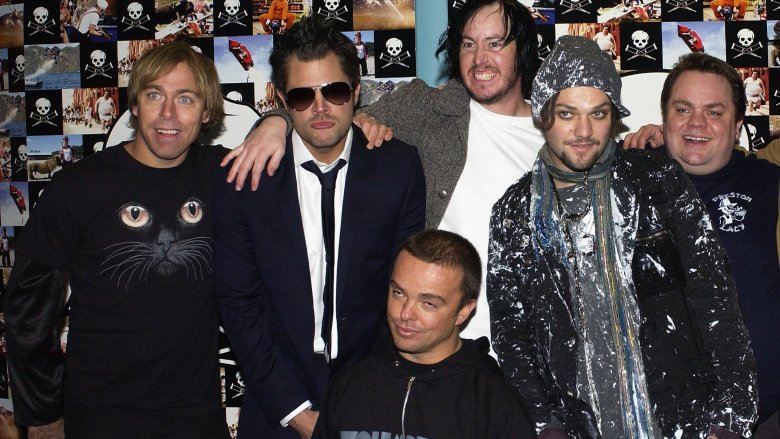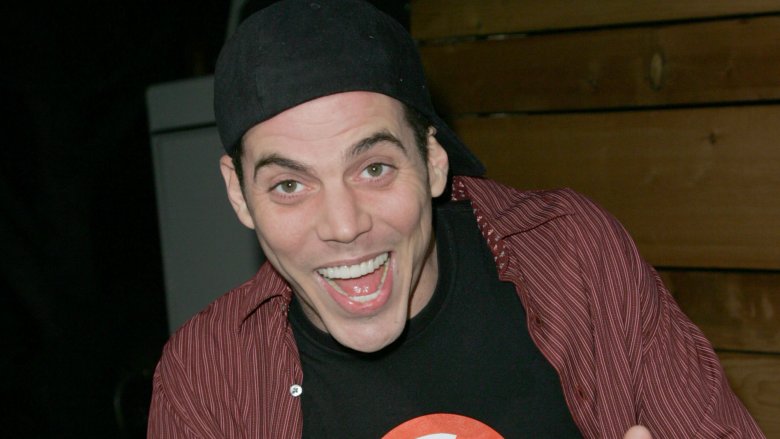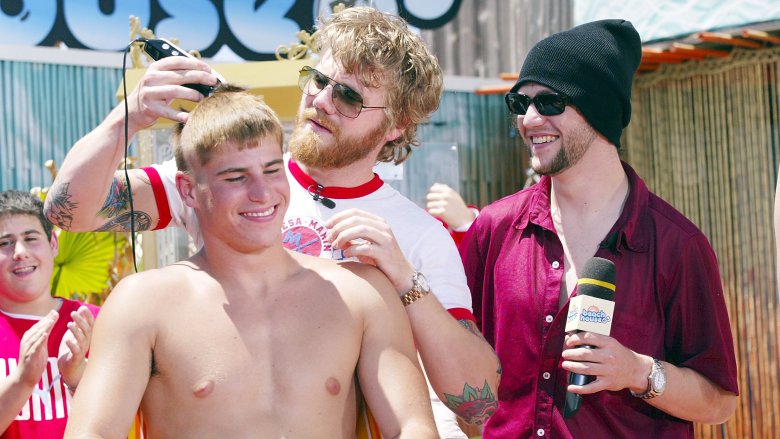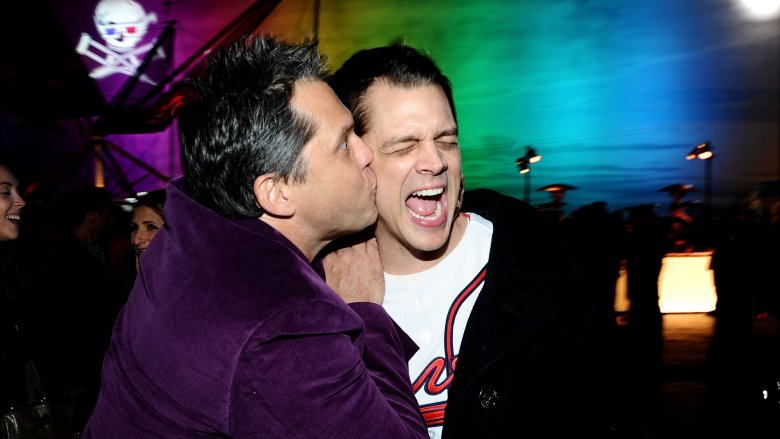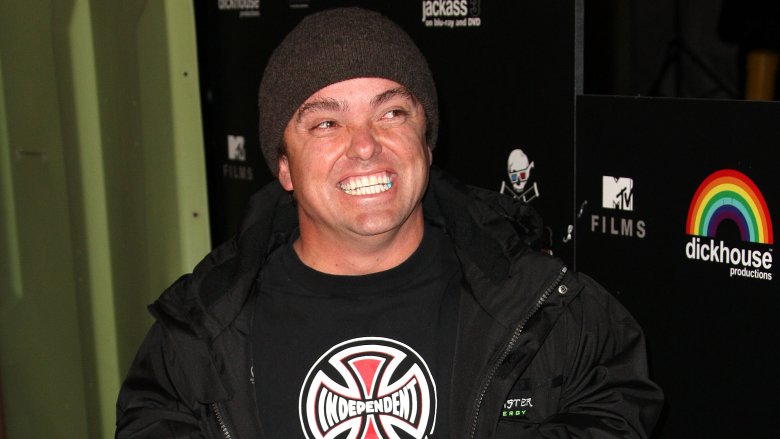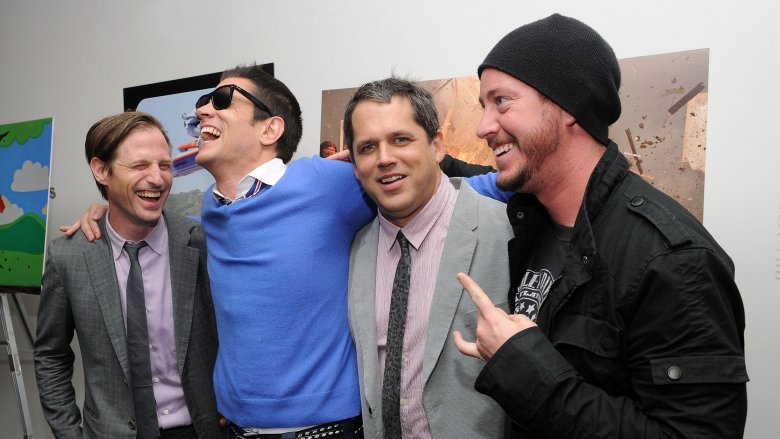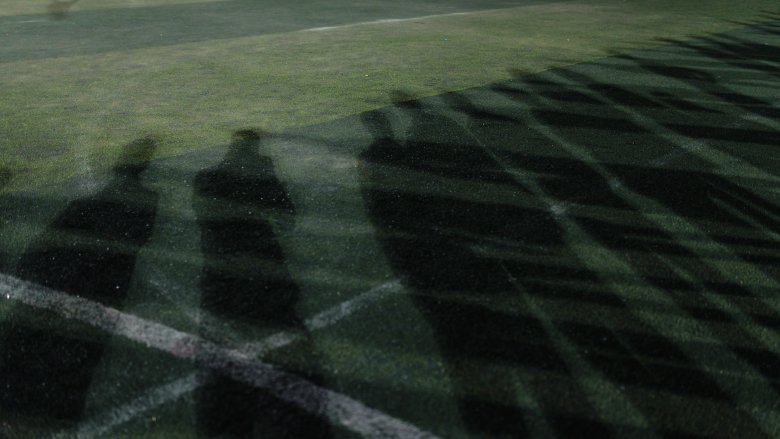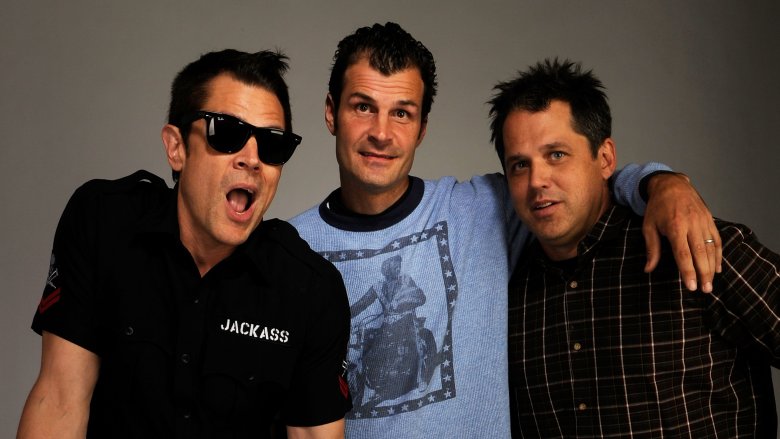How Jackass Changed Television And No One Seemed To Notice
The first strings of Jackass' frenetic theme song only hint at the chaos and comedic destruction that's to come. Johnny Knoxville's sober warning that these stunts are performed by trained professionals and that you shouldn't try them at home is in direct contrast to the cackling glee with which Knoxville and his merry band of (sado)masochists throw themselves and each other directly into harm's way.
Airing on MTV from 2000 to 2002 in three hilarious, shocking, and disgusting seasons, Jackass was the love child of '90s skater culture, sketch comedy, and stuntman risk-taking, brought together through the combined efforts of co-creators Knoxville, Jeff Tremaine, and Spike Jonze. It all started when Tremaine, as editor of skater mag Big Brother, hired Knoxville for a piece on self-defense methods. Knoxville's spin was to try each method personally... on himself. The result was so bizarre and inadvertently funny that Tremaine and Knoxville decided to film it.
At the same time, Bam Margera was doing something similar with his Camp Kill Yourself crew, attempting wild stunts and filming them. Along with Bam, Dave England and Jason "Wee Man" Acuña also had ties to Big Brother on the editorial and publishing sides. Then there was Steve-O, who'd been mailing tapes to the magazine's offices trying to get a feature. It was a perfect storm of fearlessness and foolishness, and when they joined forces, the cult phenomenon Jackass was finally born. After a bidding war between several interested parties (including a very thirsty Comedy Central), MTV won. Jackass premiered on October 1, 2000, and television was never the same. Here's why.
The Jackass boys were a new breed of celebrity
In the pre-Jackass universe, your chances of becoming famous for nonsense were slim to none if you were regular folk. You could send a tape to America's Funniest Home Videos and hope that someone's cat didn't do something bizarre that week and beat you out of a chance in the spotlight. But Jackass took that truth and lobbed a live grenade at it, blowing it to smithereens. The Jackass crew were among the first reality television stars, famous simply for kicking each other in the nuts and throwing themselves off things with wanton abandon. The fact that the majority of the cast were conventionally good looking certainly helped audiences engage with them, for better or worse.
As the three seasons of the television show evolved into a series of movies, several of the Jackass stars used their familiar platforms to branch out into other media. Johnny Knoxville in particular had his sights on acting, so it was no surprise he quickly got cast in a romantic comedy helmed by Sarah Jessica Parker, a film called Life Without Dick, even before the final season of Jackass aired in 2002. He's had a consistent film career ever since outside the Jackass franchise, with roles in Men in Black II, The Dukes of Hazzard, and the raunchy John Waters romp A Dirty Shame, where he plays a campy sexual healer.
Steve-O, Chris Pontius, and Bam Margera went on to create a number of Jackass-inspired shows like Wildboyz, Bam's Unholy Union, and Killer Karaoke. Steve-O even wrote a memoir in 2011, Steve-O: Professional Idiot.
Jackass went viral before going viral was a thing
As technology developed and internet access spread into more homes than ever, Jackass inspired its audience to share their own lo-fi stunt videos in the hope of capturing viral fame of their own. Even in this pre-YouTube age, it wasn't long before too many wannabe jackasses were doing exactly Johnny told them specifically not to do: trying this at home. Several people died and others were severely injured while trying to recreate stunts, causing Senator Joe Lieberman to start a campaign to cancel the show. The detractors eventually won (if indirectly) as MTV increasingly placed restrictions on what Knoxville and company could show. The creators weren't willing to compromise their vision or creative framework, and chose to walk away from the series after just three seasons.
Despite its brief time in the sun, Jackass arrived at just the right tome to herald the internet as a new place from which to source amateur talent and content in a way nobody expected, especially once camera phones made it so easy to film anything on the fly without much planning. As K.T. Nelson wrote at Vice, "Honestly, if you are a viral star in the modern era, you should be forced to renounce your religion and just pray to the stars of Jackass. They are your gods now." Agreed.
Jackass pushed the social and cultural envelope
Jeff Tremaine's gonzo baby pushed the social and cultural boundaries of not only what was acceptable or tolerable behavior in public, but also what was allowed to appear on screen. Jackass was the birth of extreme reality television, and has spawned shows like Fear Factor and Naked and Afraid in the decades since. In Fear Factor, we see echoes of Steve-O swallowing a live goldfish and then vomiting it back up, or the many times the cast pranked Bam Margera with huge snakes, knowing he's deathly afraid of them. In Naked and Afraid, we can appreciate how the Jackass crew and their penchant for nudity while doing dangerous stunts long preceeded people hanging out in the woods for extended periods totally naked.
The best part of Jackass' transgressions was the way they ran a gamut from mild to absurd to crazy violent. One moment Johnny Knoxville is fake farting in a yoga class while Ryan Dunn throws himself into shrubbery from his bike, and the next Steve-O is piercing his buttcheeks shut and Dave England is taking an actual dump in a toilet showroom. There was absolutely nothing taboo or sacred to the Jackass boys including their own genitals, and that alone was refreshing, even if it did make you want to throw up from time to time.
Jackass presented creative solutions for ridiculous problems
Whatever your opinion of the Jackass crew, you cannot deny they are a most creative and resourceful gang of dudes. They used the newest technologies of the day to better capture their stunts. Before the average adventurer could just grab a GoPro at the nearest department store, the Jackass boys were modifying helmets to hold digital camcorders, mounting cameras on skateboards, and often staging multiple handheld cameras to capture the stunts from many different angles.
With the passing of time and the ballooning of budgets, the Jackass movies saw a huge jump in production value, but it's actually quite sweet to go back to moments in the original show where you can see the cast and crew as they laugh along like drunk hyenas. They often had hidden cameras in pockets or glasses for stunts that involved pranking unsuspecting folks, taking Bond-like fictions and turning them into effective reality for unique narrative moments. In an era before everyone had a high-definition camera in their pocket, Jackass found ways to make whatever tech they had access to work for them. We couldn't even have the public sketch comedy aspects of a Jackass show today, since everyone would be on their camera filming, hoping their video would go viral before anyone else's does.
Jackass created a new paradigm for modern masculinity
Yes, you can argue that the sophomoric stunts pulled by the Jackass dudes are peak toxic masculinity. They are often violent, nasty, and nonsensical, and almost certainly lead to someone getting injured, often badly. What a guy thing to do, right? In a Vice interview that accused Jackass of being "a celebration of fratboy culture," co-creator Spike Jonze begged to differ. "We all came out of skateboarding, which was the polar opposite of that," the filmmaker explained. "Most of us guys were anti-frat."
To further Jonze's point: Jackass features a group of friends who are platonically intimate with each other without homophobia or misogyny. Note how often they hug each other, sometimes even when in various stages of undress. When someone gets properly hurt, the tenderness with which they treat each other is often touching, even if they are laughing at the injury. And for a group of straight dudes, they sure like to get naked around each other all the time. Chris Pontius, in particular, cannot seem to keep his clothes on. The guys simply take these moments in stride, without anybody ever acting uncomfortable or squirrely about everyday tasks like helping a buddy attach a remote controlled airplane to his most private of parts.
Considering the many tropes that have plagued TV's depictions of masculinity since the medium's inception, the bonding between the Jackass boys was quietly revolutionary. It may seem like a bit of a leap at first glance, but look closely and you'll find there's a line to be drawn from this sort of intimate camaraderie to the non-toxic and nurturing masculinity we now see in characters like Stranger Things' Steve Harrington or the companionship between the lead characters in True Detective's third season.
Destigmatizing body diversity
Long before Game of Thrones and Tyrion Lannister (Peter Dinklage) came to TV screens, Jackass featured Jason "Wee Man" Acuña as a major player. Wee Man (Acuña's chosen stage name) was the subscription manager of Big Brother magazine when Tremaine began pulling together the Jackass concept. While many of the stunts are geared toward the performers' various skill sets, there is no discrimination against Wee Man doing the same things as everyone else.
Yes, every so often his small stature was used as a prop in skits, like the bits with Preston Lacey where Acuña pops out of a suitcase or the demonstrations of his ability to kick himself in the head. But the majority of the time he demonstrated his considerable strength and physicality, as when he hoisted Shaquille O'Neal on his back and did knee bends. Unlike other shows that objectify little people, nobody was ever laughing at Wee Man. They were always laughing with him.
For many in the audience, the show was likely the first time they saw a little person represented as a major presence in a popular series, rather than being a one-off guest role or a punchline. It wouldn't be the last — in the years since Wee Man appeared on Jackass, several other reality shows have focused on the lives and experiences of little people — for example, Little Women and Little People, Big World.
From high to low-brow and back again
Fresh off the critical success of his 1999 surrealist nightmare Being John Malkovich and in the middle of his next high-brow production, Adaptation (starring Meryl Streep no less), Spike Jonze would seem like an unlikely co-creator for a trashy physical comedy sketch show that relies on lewd jokes, poo flinging, and people getting hit in the junk. Nevertheless, this Academy Award-winning cinema auteur was perfectly capable of doing both, and was happy to do it. As Jackass became a movie franchise capable of box office success, the influence of Jonze's increasing involvement both behind and in front of the camera became clearer. His presence unquestionably elevated the show and helped it achieve its strange potential.
While Spike Jonze wasn't the first auteur film director to dabble in television — David Lynch and Twin Peaks immediately come to mind as one of the firsts — his involvement in Jackass heralded an ongoing trend of filmmakers with big visions dipping their toes in the small screen world. Since Jackass premiered at the dawn of the 21st century, we have seen the Wachowski Sisters (Sense8), Cary Joji Fukunaga (True Detective), Jane Campion (Top of the Lake), Ava DuVernay (Queen Sugar), Spike Lee (She's Gotta Have It), and many others find varied success with television.
Jackass exposed human apathy in real time
Jackass was not like the scripted reality television we have now. The three seasons on MTV were fully off-the-cuff, and provided valuable socio-cultural insight. Up until that point — and in a pre-social media world — we never saw people's active apathy towards other humans the way we did in Jackass, making it a fascinating study of the Bystander Effect in action. This theory states that groups of people will be less inclined toward action than people witnessing something on their own. The social psychologists who coined the phrase, Bibb Latané and John Darley, call this a "diffusion of responsibility," wherein groups will assume someone else will jump in to intervene, and thus, nobody does anything.
In the "Runaway Casket" stunt, Johnny Knoxville pretends to be a hearse driver with a coffin that keeps falling out of the car. Worse, Broken Arm Guy (also played by Knoxville) needs help doing up his zipper after using the bathroom. Of all the dozens of people he asks for help, you can count on one hand the folks who have compassion. The gang's 2013 movie Bad Grandpa brought even more do-nothing folks from the woodwork. It's incredible to watch people watch the titular disaster-prone grandfather (Knoxville, naturally) while offering little but disgust, rather than helping this old man who is clearly senile and in need of assistance.
Today, we see homemade videos of human cruelty and apathy on the regular, from talk shows to the news. Jackass may not be a direct cause of this phenomenon of human behavior, but it was certainly an unfortunate observation that has only become more pronounced in the years since.
Jackass made entertainment out of the messiness of being human
Regardless of whatever sociological observations or cultural impact the show brought about, the general vibe of Jackass is one of mindless entertainment. It is art is in its fundamental fearlessness, and it allows us to unplug from the real world, however briefly, a as we watch a bunch of stunt people make terrible decisions for laughs. While they were making those three iconic seasons it really was all fun and games. And it shows. They remind us not to take ourselves too seriously, and to always be willing to laugh at ourselves, even when fame and fortune become part of the bigger picture.
Writer Jason Concepcion hailed Jackass as a portrait of the human condition. "This is profoundly sophomoric material. But it's also uniquely life-affirming," Concepcion wrote at The Ringer. "An effective Jackass stunt reminded us that — beneath the glossy personas people present to the world, these beautifully filtered images of meals and vacations and perfect friends — we bleed, we s**t, and we die. And though we struggle mightily, every day, to distract ourselves from these truths, we shouldn't. Indeed, we can engage with those realities in ways that are hilarious."
In short, the Jackass boys taught us how to present our authentic selves long before social media influencers became celebrities and YouTubers began taking the place of TV stars. That sort of unfiltered humanity is all around us in the media now, but Jackass was where we first learned that it's okay to be outrageously silly in public and film it, so long as you're careful... and a trained professional.
